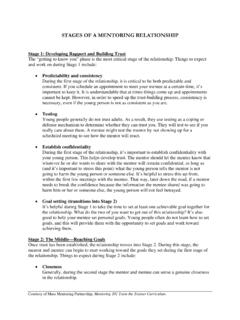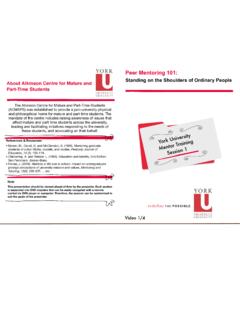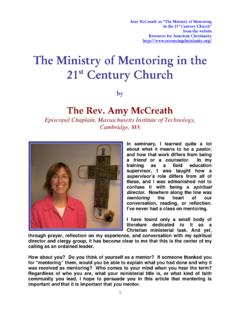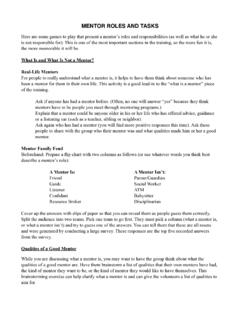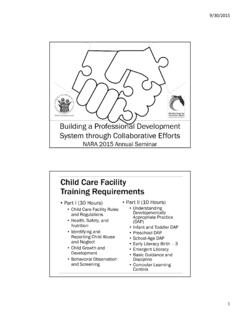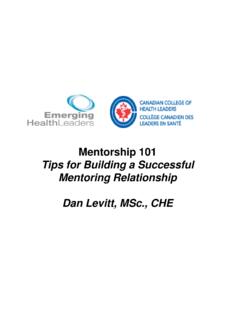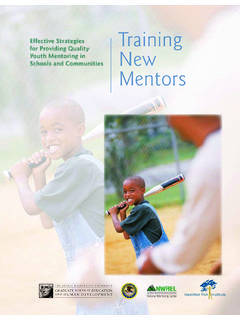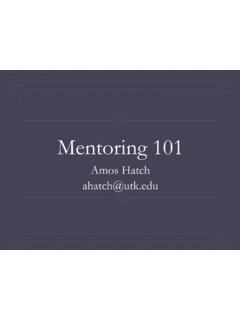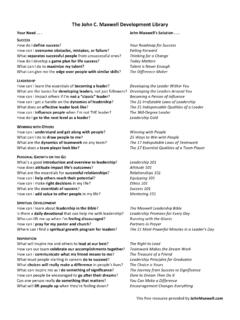Transcription of Executive Mentoring 101 - Management Mentors
1 Executive Mentoring 101 Note: these are the same resources that are in the " Executive Mentoring 101" eBook. We made these resources available as a PDF so that you can print them out. Mentoring RESOURCES We ve discussed the issues surrounding Executive Mentoring and have, in some places, provided insights on how to effectively mentor. In this section, we focus on some additional resources that are helpful for Executive Mentors . The symbol below is used to indicate that this is a tool that can be used in your Mentoring relationship. MINDFUL LISTENING 2 All of us understand the importance of listening when engaged in communicating with another person. However, in an environment where multi-tasking is highly praised, we can easily forget some of the basic ideas behind good listening. What follows is a quick and easy review of the key concepts for effective listening. Although divided into Listening as a Mentor and Listening as a Mentoree, all concepts apply when engaged in a dialogue.
2 A recommend approach to using this particular tool is to take a minute or two prior to meeting with your partner and removing all distractions as you prepare to engage in your Mentoring session. It s call creating a space and being mindful of what you are about to do. Doing this will help to remove distractions currently weighing on you and to create an internal mind shift that will allow you to be more present in the meeting. Although the tool is meant to be done by yourself, a variation is for you and your partner to both review these concepts together, quietly, and then begin the session. In this way, you are already Mentoring your partner by creating an environment that welcomes his/her participation and conversation with you. Your mentoree may not have a copy of this tool in his/her workbook so you may wish to make a copy and share it with them. Listening as a Mentor: 3 Listen to your present o Take a deep breath and while exhaling become aware of what is uppermost in your mind (your last phone call, that deadline you have to meet, etc.)
3 And decide to put this aside until after the session is over so as not to be distracted in your work with your mentoree today. Listen to your expectations o Imagine your partner and become aware of your own expectations of him/her in today s session. Be mindful that today s session is not about meeting your expectations but about being available to what your mentoree needs. Be willing to let go of your expectations so as to be more fully open to the possibilities in today s session. Listen to your experience o Remember that your life and career experiences have led you to serving as a mentor and that this wealth of wisdom is the treasury that you offer to your mentoree. Listen to your authenticity o Remember who you are. As a mentor you are not being asked to be perfect nor to have all the answers but simply to be genuine and willing to help in the best way you can as the unique person you are. Listen with intention o Make a conscious decision that you will bring your full awareness to today s session.
4 The act of doing this will make a difference in how you interact and what you bring to the session. Listen beyond your preconceived notions o Labels, stereotypes, and judgments affect your ability to be open to possibilities in your interaction with your mentoree. What preconceived notions do you still hold about your partner and what impact are they having on your relationship? What can you do to change their impact? Listen wholistically o With your mentoree, listen not only to the words but also attend to: what is unspoken, body language, mood, etc. Communication is greater than the sum of words. Open yourself up to listening to the entire message being conveyed by your mentoree. Listen to diversity o Be open to the uniqueness of your mentoree and how that is made known to you in the Mentoring session. Your partner, like yourself, is more than just a co-worker but is also from a unique culture, religion, gender, race, etc. Be open to differences and thereby, you ll find commonalities.
5 Listen to the silence: 4 o Silence can be the pause that can bring forth an important insight. Don t fear silence but rather, accompany your mentoree in the silence and allow that person to struggle with it and see what arises from that experience. Support the silence as an opportunity for growth. Listen for the question o Giving answers is the easiest part of being a mentor. Often, however, it is the unstated question that is most critical to a mentoree s development. What is your mentoree really asking or seeking? Help him or her discover their answer to that question and you will have truly assisted in their transformation. Listen for meaning o Your mentoree is not simply striving to develop professionally but to create a meaningful life. Listen for what the mentoree values and for what makes him/her authentic and assist him/her in your interactions in incorporating what they are learning into who they want to become.
6 Listening as a Mentoree: 5 Listen to your present o Take a deep breath and while exhaling become aware of what is uppermost in your mind (your last phone call, that deadline you have to meet, etc.) and decide to put this aside until after the session is over so as not to be distracted in your work with your mentor today. Listen to your expectations o Imagine your partner and become aware of your own expectations of him/her in today s session. Be mindful that your mentor s role is to partner in your journey and not to provide you with answers. Be open to whatever happens in today s session regardless of your expectations. Listen to your authenticity o Remember who you are. As a mentoree, you are the one responsible for your own development. Be honest in your interactions with your mentor as trust develops so that you can take the risks this opportunity provides you. Listen with intention o Make a conscious decision that you will bring your full awareness to today s session.
7 The act of doing this will make a difference in how you interact and what you bring to the session. Listen with openness o Let go of being certain about the specific goal(s) you are working on, the approach you should be taking or the path you should be following and be open to exploring alternatives in conversations with your mentor. Think creatively and be ready to explore as a means to true self-discovery. Listen to the silence: o Silence can be the pause that can bring forth an important insight. Don t fear silence but rather, take a moment to listen deeply within yourself and see what arises during that silence. This can often be the spark that leads to real understanding and change. Listen with gratitude o Your mentor feels responsible for assisting you in your journey. Whatever he or she shares with you, whether you find it useful or less so, be thankful for the effort made and the commitment shown. Listen for the lesson you can learn from what is being shared. Listen to reflect o The impact of your session with your mentor goes beyond that particular meeting.
8 Listen to the impact it has the next day, the next week, etc. Reflect on your experience and you ll find that you will have gained more than at first may be obvious. Mentoring has a ripple effect be mindful of that effect on you. Listen for change 6 o Mentoring results in change. Listen to those moments in Mentoring which call you to change. This means being open to hearing things that may be difficult. Change requires courage. Be willing to believe in yourself to make those changes that will truly make you the person you want to become. Listen to the future o Mentoring is about creating the future by being in the here and now. No matter what obstacles you may feel you face in your professional and personal development, there is still a future to be had. Avoid being stuck in the past and letting those things that hinder you continue to do so. Be open to being in control of your own destiny by having a vision of the future and working toward it.
9 7 ASKING QUESTIONS TOPICAL RESOURCES The most useful technique in Mentoring is asking the right questions not providing the answers. Asking the right questions allows the Executive mentor to understand more clearly how a mentoree thinks and what leads to certain choices or perceptions. It is an invaluable tool in being an effective mentor. The areas of focus in the pages that follow and the recommended questions are samples. Mentors are encouraged to adapt these questions to their own unique style and situation. With all of these questions, let the mentoree s response form the basis for further discussion, while also sharing your own response to the questions. A. Exploring Mutual Values: 8 A value is a principle that defines who you are and that drives you in your choices, actions and decisions.
10 This discussion is meant to explore with the mentoree what values provide a basis or guide for choices they make. What s the most important value that guides you in your work and why? What motivates you to succeed and why? What was the most important life-altering experience you ve ever had and how did it impact you? What are the values that govern our company? Where do you think we succeed in living these values as a company? Where do you think we fall short and why? Since you have been with the company, have these values changed or remained the same? What leads you to that conclusion? How do the company s values impact: our customers, our employees, our society? How do you define success in terms of your career in your value system? (mentor shares: This is what success has meant for me in my career.) Describe a situation where you felt you had to decide whether to compromise a value you hold dear to succeed or remain true to that value and what choice you made and why?
